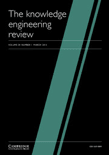
KNOWLEDGE ENGINEERING REVIEW
metrics 2024
Transforming Ideas into Impactful Solutions
Introduction
KNOWLEDGE ENGINEERING REVIEW, published by Cambridge University Press, is a prestigious academic journal dedicated to the dynamic fields of Artificial Intelligence and Software Engineering. With an ISSN of 0269-8889 and an E-ISSN of 1469-8005, this journal has been a pivotal platform for scholarly communication since its inception in 1984, with its impact continuously recognized through its Q2 category ranking in both fields as of 2023. Operating from its headquarters in the United Kingdom, it boasts a robust Scopus ranking, placing it in the 73rd percentile for Software and the 69th percentile for Artificial Intelligence, a testament to its influence and relevance. Though it does not offer open access, the journal remains dedicated to advancing knowledge engineering by publishing high-quality research articles, insightful reviews, and innovative methodologies that address both theoretical and practical challenges. Researchers, professionals, and students find this journal an invaluable resource for cutting-edge developments in the realm of knowledge engineering.
Metrics 2024
 0.77
0.77 2.80
2.80 2.20
2.20 71
71Metrics History
Rank 2024
Scopus
IF (Web Of Science)
JCI (Web Of Science)
Quartile History
Similar Journals
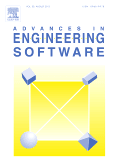
ADVANCES IN ENGINEERING SOFTWARE
Innovating Solutions for Engineering Challenges.ADVANCES IN ENGINEERING SOFTWARE, published by Elsevier Science Ltd, stands at the forefront of interdisciplinary research in the realms of engineering and software development. With an impressive impact factor reflected in its Q1 and Q2 rankings in the Engineering (Miscellaneous) and Software categories, respectively, this journal serves as an essential platform for researchers and practitioners alike to disseminate innovative findings and methodologies from 1982 to the present. Strategically positioned within the United Kingdom, it engages scholars, professionals, and students by publishing high-quality articles that emphasize advancements in software applications related to engineering challenges. Although it does not currently offer open access, the journal remains highly regarded within the academic community, consistently attracting impactful research and maintaining a commendable Scopus ranking within the top tiers of both general engineering and software disciplines. Explore the latest contributions to enhance your knowledge and stay updated on trailblazing developments in engineering software.
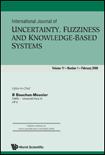
INTERNATIONAL JOURNAL OF UNCERTAINTY FUZZINESS AND KNOWLEDGE-BASED SYSTEMS
Empowering research through the lens of uncertainty and fuzziness.Welcome to the INTERNATIONAL JOURNAL OF UNCERTAINTY FUZZINESS AND KNOWLEDGE-BASED SYSTEMS, a prestigious publication dedicated to advancing the fields of artificial intelligence, control systems engineering, information systems, and software research. Published by WORLD SCIENTIFIC PUBL CO PTE LTD in Singapore, this journal serves as a vital forum for the dissemination of innovative theories, methodologies, and applications rooted in the coexistence of uncertainty and fuzziness within knowledge-based systems. With its ISSN 0218-4885 and E-ISSN 1793-6411, the journal consistently ranks in the Q3 category across various Scopus categories, including Control and Systems Engineering and Information Systems, reflecting its influential position in the academic community. Researchers and practitioners alike will find valuable insights and the latest trends through its comprehensive articles, making this journal an essential resource for those seeking to navigate the complexities of this evolving field.

Acta Cybernetica
Cultivating Knowledge in the Evolving Landscape of Cybernetics.Acta Cybernetica, published by the University of Szeged, Faculty of Science, serves as a vital platform for researchers and practitioners in the fields of computational theory, computer science, and engineering. With an ISSN and E-ISSN of 0324-721X, this Hungarian journal has been disseminating valuable research since 1990 and is projected to continue through 2024. Although it currently holds a Q4 ranking in multiple categories—including computational theory, computer vision, and theoretical computer science—its impact lies in fostering innovative research discussions and multidisciplinary collaborations. Scholars in its specialized fields will find a wealth of insights that contribute to emerging trends and developments. While Acta Cybernetica is not an open-access journal, it remains an essential resource for advancing knowledge and practices within its academic community.

PROGRAMMING AND COMPUTER SOFTWARE
Unveiling Insights into Evolving Programming TechniquesPROGRAMMING AND COMPUTER SOFTWARE is a distinguished journal committed to advancing the field of software development and programming methodologies. Published by PLEIADES PUBLISHING INC, this journal has been a valuable resource since its inception in 1978, reaching out to researchers, professionals, and students alike. With an emphasis on rigorous peer-reviewed articles, the journal holds a Q3 ranking in the realm of Software according to the latest 2023 Category Quartiles. Though it does not offer open access, the journal ensures that high-quality research is disseminated to its audience, providing insights into evolving programming techniques, software engineering challenges, and innovative solutions. With its convergence of years extending to 2024, PROGRAMMING AND COMPUTER SOFTWARE remains a pivotal publication, fostering a deeper understanding of the complexities in computer programming while supporting the broader software community.
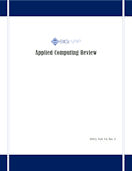
Applied Computing Review
Navigating the Intersection of Theory and ApplicationApplied Computing Review is a prominent academic journal published by the Association for Computing Machinery (ACM), an esteemed organization known for advancing the computing profession. Focusing on the intersection of practical applications and theoretical foundations, this journal serves as a vital platform for disseminating research in the field of applied computing, facilitating knowledge sharing among researchers, professionals, and students alike. With an ISSN of 1559-6915, the journal encompasses a wide array of topics including software engineering, data analytics, and application development, addressing current trends and challenges in the industry. Although it does not offer open access, its rigorous peer-review process ensures high-quality publications that significantly contribute to the discipline. Positioned within a competitive landscape, Applied Computing Review is dedicated to fostering innovation and providing insightful perspectives that inspire further research, thereby solidifying its importance in the field of applied computing.
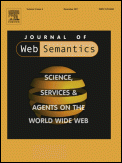
Journal of Web Semantics
Connecting Technology and Human Interaction through Cutting-Edge Research.Journal of Web Semantics, published by ELSEVIER, stands at the forefront of interdisciplinary research in the realms of Computer Networks and Communications, Human-Computer Interaction, and Software Engineering. With an impressive impact on the academic landscape, this journal holds a significant Q2 quartile ranking in multiple fields as of 2023, reflecting its strategic positioning within the top tier of scientific journals. As a valuable resource for researchers, professionals, and students, it provides a platform for innovative articles addressing contemporary challenges and advancements in web semantics—a crucial aspect of improving web usability and data integration. Operating with a Scopus Rank that places it in the commendable 71st, 67th, and 60th percentiles across its respective categories, the journal facilitates access to high-quality research findings, fostering a vibrant community of scholars dedicated to enhancing the synergy between technology and human interaction. The Journal of Web Semantics continues to evolve, marking its significance from 2003 to 2024 and offering a vital space for discourse that shapes the future of web technologies.

Jordanian Journal of Computers and Information Technology
Connecting Scholars Through Open Access InsightsJordanian Journal of Computers and Information Technology, published by Princess Sumaya University and SRSF, stands as a significant platform for scholarly research in the realm of computer science, particularly in topics related to emerging technologies and information systems. With its Open Access model initiated in 2015, the journal facilitates global access to high-quality research findings, embodying the principles of knowledge sharing and academic collaboration. The journal's ranking in the Q3 category of Computer Science (miscellaneous) and its placement in the 54th percentile of Scopus' General Computer Science rankings underscore its growing reputation among researchers and professionals alike. Situated in Amman, Jordan, the journal actively contributes to the regional and international discourse on computing methodologies, applications, and innovations, making it an indispensable resource for scholars seeking to advance their understanding and engage with contemporary issues in technology.

DATA & KNOWLEDGE ENGINEERING
Exploring the Nexus of Data and InsightData & Knowledge Engineering is a prestigious, peer-reviewed journal dedicated to the fields of data management, information systems, and knowledge engineering. Published by Elsevier in the Netherlands, this journal serves as a critical resource for researchers, professionals, and students alike, offering a platform for high-quality, original research and innovative approaches in the realm of data-driven technologies and methodologies. With a considerable impact factor and classified in the Q2 quartile for Information Systems and Management, it ranks 47th out of 148 journals in its category, placing it in the esteemed 68th percentile according to Scopus metrics. Data & Knowledge Engineering covers a wide array of topics including database systems, data mining, and knowledge representation, ensuring that it remains at the forefront of advancing understanding and application in these dynamic fields. Engage with compelling articles and significant findings published since its inception in 1985, as the journal continues to shape the future of data-centric research up to 2024 and beyond.

Frontiers of Computer Science
Empowering the Global Academic Community through Open AccessFrontiers of Computer Science is a leading peer-reviewed journal dedicated to advancing the field of computer science through the publication of high-quality research articles, reviews, and theoretical discussions. Published by HIGHER EDUCATION PRESS, this journal has gained significant recognition, currently boasting a prestigious impact factor and ranking in the Q1 quartile for both Computer Science (miscellaneous) and Theoretical Computer Science categories in 2023. With a focus on the intersection of computational theory and practical applications, it serves as a vital platform for researchers, professionals, and students alike who are eager to contribute to and stay updated with groundbreaking developments. The journal’s scope encompasses a wide range of topics, reflecting the diverse nature of computer science today. Operating from Beijing, China, it emphasizes Open Access, ensuring that vital research is readily available to the global academic community. With its convergence period spanning from 2013 to 2024, Frontiers of Computer Science remains committed to fostering innovation and scholarly dialogue that drives the future of technology.
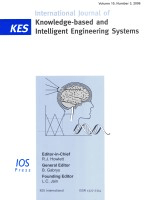
International Journal of Knowledge-Based and Intelligent Engineering Systems
Transforming Ideas into Intelligent Engineering SolutionsThe International Journal of Knowledge-Based and Intelligent Engineering Systems, published by IOS PRESS, serves as a vital platform for scholars and practitioners involved in the fields of Artificial Intelligence, Control and Systems Engineering, and Software Development. Founded in 2004 and continuously publishing through to 2024, this journal stands out with its comprehensive coverage of innovative methodologies and applications that leverage knowledge-based systems. Although currently listed in Q4 for Artificial Intelligence and Q3 for Control and Systems Engineering, it features an increasing trajectory in the scientific community, as indicated by its rankings in Scopus—which reflects the growing importance of intelligent engineering systems in contemporary research. With a commitment to disseminating cutting-edge research without open access constraints, this journal is essential for those seeking to understand and contribute to advancements in intelligent systems. Join a global community of researchers and industry leaders by engaging with the latest findings shared in this well-regarded journal.